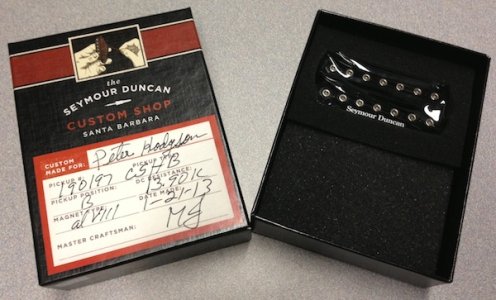Falloffthebonetone
New member
Re: The In-Depth Documentation of My Long-Winded, Brutal Quest For Tone
On the box your custom shop pickup would come in it will have the magnet type, the position the pickup was designed for, the DC resistance, and the signature/initials of whoever wound your pickup.

We seem to have misunderstood each other. I thought you were saying that I shouldn't care about the specs as long as the job was done, and I replied saying that I had a personal vested interest in the components of my gear. Of course I'll let MJ do anything she wants to get me that pickup, and defer completely to what she does, but I'll still maintain a knowledge of what goes into it, and have my say on specs such as output and bobbin colour.
On the box your custom shop pickup would come in it will have the magnet type, the position the pickup was designed for, the DC resistance, and the signature/initials of whoever wound your pickup.

